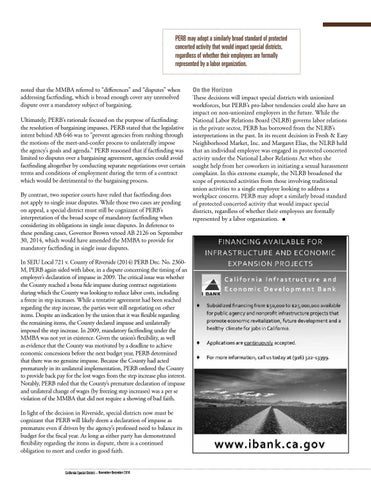PERB may adopt a similarly broad standard of protected concerted activity that would impact special districts, regardless of whether their employees are formally represented by a labor organization.
noted that the MMBA referred to “differences” and “disputes” when addressing factfinding, which is broad enough cover any unresolved dispute over a mandatory subject of bargaining. Ultimately, PERB’s rationale focused on the purpose of factfinding: the resolution of bargaining impasses. PERB stated that the legislative intent behind AB 646 was to “prevent agencies from rushing through the motions of the meet-and-confer process to unilaterally impose the agency’s goals and agenda.” PERB reasoned that if factfinding was limited to disputes over a bargaining agreement, agencies could avoid factfinding altogether by conducting separate negotiations over certain terms and conditions of employment during the term of a contract which would be detrimental to the bargaining process. By contrast, two superior courts have ruled that factfinding does not apply to single issue disputes. While those two cases are pending on appeal, a special district must still be cognizant of PERB’s interpretation of the broad scope of mandatory factfinding when considering its obligations in single issue disputes. In deference to these pending cases, Governor Brown vetoed AB 2126 on September 30, 2014, which would have amended the MMBA to provide for mandatory factfinding in single issue disputes. In SEIU Local 721 v. County of Riverside (2014) PERB Dec. No. 2360M, PERB again sided with labor, in a dispute concerning the timing of an employer’s declaration of impasse in 2009. The critical issue was whether the County reached a bona fide impasse during contract negotiations during which the County was looking to reduce labor costs, including a freeze in step increases. While a tentative agreement had been reached regarding the step increase, the parties were still negotiating on other items. Despite an indication by the union that it was flexible regarding the remaining items, the County declared impasse and unilaterally imposed the step increase. In 2009, mandatory factfinding under the MMBA was not yet in existence. Given the union’s flexibility, as well as evidence that the County was motivated by a deadline to achieve economic concessions before the next budget year, PERB determined that there was no genuine impasse. Because the County had acted prematurely in its unilateral implementation, PERB ordered the County to provide back pay for the lost wages from the step increase plus interest. Notably, PERB ruled that the County’s premature declaration of impasse and unilateral change of wages (by freezing step increases) was a per se violation of the MMBA that did not require a showing of bad faith. In light of the decision in Riverside, special districts now must be cognizant that PERB will likely deem a declaration of impasse as premature even if driven by the agency’s professed need to balance its budget for the fiscal year. As long as either party has demonstrated flexibility regarding the items in dispute, there is a continued obligation to meet and confer in good faith. California Special District – November-December 2014
On the Horizon These decisions will impact special districts with unionized workforces, but PERB’s pro-labor tendencies could also have an impact on non-unionized employers in the future. While the National Labor Relations Board (NLRB) governs labor relations in the private sector, PERB has borrowed from the NLRB’s interpretations in the past. In its recent decision in Fresh & Easy Neighborhood Market, Inc. and Margaret Elias, the NLRB held that an individual employee was engaged in protected concerted activity under the National Labor Relations Act when she sought help from her coworkers in initiating a sexual harassment complaint. In this extreme example, the NLRB broadened the scope of protected activities from those involving traditional union activities to a single employee looking to address a workplace concern. PERB may adopt a similarly broad standard of protected concerted activity that would impact special districts, regardless of whether their employees are formally represented by a labor organization.
